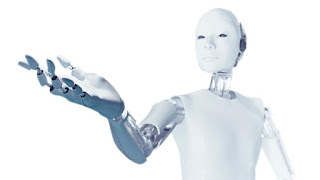Artificial Intelligence
Few people really know the answer to this question. Artificial intelligence is already around us,
but experts disagree on when it will fully develop. As technology advances it
raises questions about artificial intelligence against human intelligence and
whether some tasks require uniquely
human attributes.
While we tend to associate AI with
fictional movies – with Star Wars, 2011: A Space Odyssey and the like – the
concepts and gadgets introduced are quickly becoming a “new normal”. We’ve
already started to leverage AI to automate mundane tasks, including home
delivery (e.g., Instacart), navigation (e.g., Google Maps), transportation
(e.g., Uber), digital music selection (e.g., Spotify), and more.
 In this growing debate, the given wisdom has been that, if anything,
AI will augment human tasks, but not replace them, anytime soon. Still, in a
recent talk expert Andrew McAfee, bolstered the
argument that machines are edging in on supposedly uniquely human tasks. McAfee
described the pace of technology change as rising exponentially. “Certainly,
AI is proving to be an invaluable tool, and intelligent workflow is going to be
the labor-saving norm within just a few years,” said Scott Robinson, a
SharePoint and business intelligence expert.
In this growing debate, the given wisdom has been that, if anything,
AI will augment human tasks, but not replace them, anytime soon. Still, in a
recent talk expert Andrew McAfee, bolstered the
argument that machines are edging in on supposedly uniquely human tasks. McAfee
described the pace of technology change as rising exponentially. “Certainly,
AI is proving to be an invaluable tool, and intelligent workflow is going to be
the labor-saving norm within just a few years,” said Scott Robinson, a
SharePoint and business intelligence expert.
“if anything, AI will augment human tasks,”
While the evidence is clear that machine learning and AI-enabled
robots will likely supplant human work, the question is how many and how soon. These
developments could gather steam in the near future and apply not only to
repetitive tasks but also to knowledge. According to some studies 49% of work could be supplanted by
automation by 2055.
Some experts compare the changes
brought by AI to those of the Industrial Revolution, where old tasks gave way to new human opportunities. “We
cannot definitively say whether historical precedent will be repeated this
time," the report said. "But our analysis shows that humans will still be needed in the workforce.” While technology is supplanting human
activity, digital platforms from Amazon and Alibaba to Uber and Upwork and the
growing importance of data analytics will create new efficiencies and
opportunities in the job market.
Predicting the future is a delicate game. We can only
rely on our predictions of what we already have, and yet it’s impossible to
rule anything out.
We don’t yet know whether AI will usher in a golden
age of human existence, or if it will all end in the destruction of everything
humans cherish. What is clear, though, is that thanks to AI, the world of the
future could bear little resemblance to the one we inhabit today.
Comentarios
Publicar un comentario